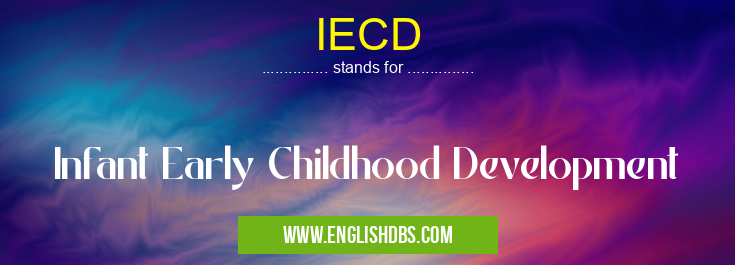What does IECD mean in DEVELOPMENT
Infant Early Childhood Development (IECD) is a comprehensive approach to promoting the optimal development of children from birth to age 8. It recognizes that the early years are a critical period for brain development, and that experiences during this time can have a profound impact on children's future health, well-being, and success.

IECD meaning in Development in Community
IECD mostly used in an acronym Development in Category Community that means Infant Early Childhood Development
Shorthand: IECD,
Full Form: Infant Early Childhood Development
For more information of "Infant Early Childhood Development", see the section below.
» Community » Development
What does IECD Stand for?
IECD stands for Infant Early Childhood Development. It is a term used to describe the policies, programs, and services that aim to support the healthy development of children from birth to age 8.
Meaning of IECD in COMMUNITY
IECD is particularly important in community settings, where children may face challenges such as poverty, violence, or lack of access to quality education and healthcare. By providing comprehensive IECD services, communities can help to ensure that all children have the opportunity to reach their full potential.
Components of IECD
IECD typically includes a range of components, such as:
- Prenatal care: Supporting pregnant women to ensure the health of both mother and baby.
- Early childhood education: Providing high-quality early learning experiences that promote cognitive, social, and emotional development.
- Health and nutrition: Ensuring that children have access to essential health services and nutritious food.
- Family support: Providing families with resources and support to promote positive parenting and home environments.
Benefits of IECD
Investing in IECD has been shown to have a wide range of benefits for children, families, and society as a whole, including:
- Improved child health and well-being
- Enhanced cognitive and social development
- Reduced risk of developmental delays and disabilities
- Increased school readiness and academic achievement
- Lower crime rates and improved social cohesion
- Reduced healthcare costs
Conclusion
IECD is a crucial investment in the future of our children and communities. By providing comprehensive IECD services, we can help to ensure that all children have the opportunity to reach their full potential and thrive.
Essential Questions and Answers on Infant Early Childhood Development in "COMMUNITY»DEVELOPMENT"
What is Infant Early Childhood Development (IECD)?
IECD encompasses a holistic approach to promoting the physical, cognitive, social, and emotional development of children from birth to age 8. It emphasizes the importance of early experiences, as they lay the foundation for future health, well-being, and success.
Why is IECD important?
IECD is crucial because the first eight years of life are a period of rapid brain development. Positive experiences during this time can enhance cognitive abilities, emotional regulation, and social skills. On the other hand, negative experiences can have detrimental effects on children's development.
What are the key components of IECD?
IECD includes several key components:
- Health and Nutrition: Ensuring children's basic needs are met, including adequate nutrition and access to healthcare.
- Cognitive Development: Promoting language, literacy, and problem-solving skills.
- Social and Emotional Development: Encouraging positive interactions, empathy, and self-regulation.
- Caregiving and Parenting: Supporting parents and caregivers in providing nurturing and stimulating environments.
How can I promote IECD in my community?
There are several ways to promote IECD in your community, such as:
- Supporting early childhood education programs: Providing access to quality early learning opportunities for all children.
- Training and empowering caregivers: Offering parenting classes and workshops to improve parenting knowledge and skills.
- Creating safe and nurturing environments: Establishing community spaces where children can engage in play and social interactions.
- Advocating for policies: Supporting government policies that prioritize IECD and address the needs of young children and families.
What are some resources for IECD?
Numerous resources are available to support IECD efforts, including:
- World Health Organization (WHO): Provides guidelines and recommendations on IECD best practices.
- UNICEF: Advocates for children's rights and promotes IECD globally.
- National Association for the Education of Young Children (NAEYC): Offers resources and support for early childhood educators and professionals.
- Local community organizations: Often provide IECD programs and support services.
IECD also stands for: |
|
| All stands for IECD |
